Januvia 50 mg
Januvia 50 mg includes Sitagliptin, a dipeptidyl peptidase-4 (DPP-4) inhibitor that is used to treat adults with type 2 diabetes. Januvia 50 mg is used to treat type 2 diabetes in patients who are unable to regulate their blood sugar levels via diet and exercise alone. It is the first-line therapy for type 2 diabetes patients, restoring the body’s insulin responsiveness. Insulin is the hormone that regulates blood sugar levels. Individuals with type 2 diabetes either produce insufficient insulin or the insulin produced is unable to work properly in the body (insulin resistance). Type 2 diabetes is most commonly found in middle-aged or older adults, which is why it is also referred to as adult-onset diabetes.
Januvia 50 mg should not be used to treat type 1 diabetes or diabetic ketoacidosis. Januvia 50 mg works by inhibiting DPP-4 (an enzyme that degrades the hormone ‘Incretin’). The enzyme ‘Incretins’ assists the body in producing additional insulin just when it is required and decreasing blood sugar levels produced by the liver when they are not required.
Januvia 50 mg should be taken on an empty stomach or with food. However, for optimal outcomes, it should be taken at the same time of day each time. For the best guidance, your doctor will determine the appropriate dose, which may alter periodically based on your condition. Hypoglycemia (low blood glucose levels), upper respiratory tract infection, nasopharyngitis (nose and throat infection caused by a common cold), and headache are the most often reported side effects of Januvia 50 mg.
Januvia 50 mg should not be stopped without visiting your doctor, even if you feel better, as your blood sugar level will continue to fluctuate. If you suddenly stop taking Januvia 50 mg, your blood sugar levels may rise, increasing your risk of vision loss (retinopathy), kidney damage (nephropathy), and nerve damage (neuropathy). If you have severe renal or liver illness, you should not take Januvia 50 mg. Kindly inform your doctor if you have a cardiac condition, are pregnant or planning to become pregnant, or are breastfeeding.
Consumption of Januvia 50 mg for an extended period of time may result in severe pancreatitis (swollen pancreas) and serious kidney problems. When Januvia 50 mg is used with other anti-diabetic medications or insulin therapy, an increased risk of hypoglycemia (low blood sugar level) may occur. Your doctor may adjust the dose of Januvia 50 mg in this scenario. Severe allergic events such as anaphylaxis, angioedema (swelling beneath the skin), and exfoliative skin disorders such as Stevens-Johnson syndrome may develop in certain patients taking Januvia 50 mg. Januvia 50 mg’s safety and efficacy in children under the age of 18 years have not been demonstrated, and so it should not be given to them. Patients who use digoxin (a cardiac medication) in combination with Januvia 50 mg should be cautiously watched because a serious drug interaction has been documented.
Januvia 50 mg Indications Type 2 diabetic mellitus
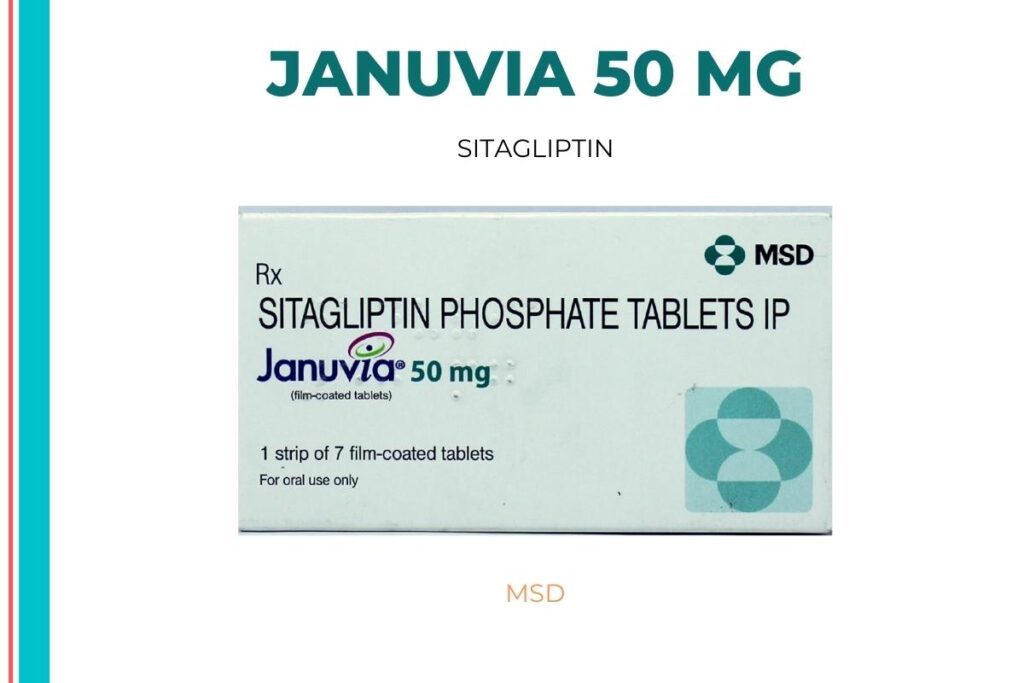
Medicinal Advantages
Januvia 50 mg works by inhibiting DPP-4 (an enzyme that degrades the hormone ‘Incretin’). The enzyme ‘Incretins’ assists the body in producing additional insulin just when it is required and decreasing blood sugar levels produced by the liver when they are not required. Thus, Januvia 50 mg is critical for blood sugar control and the prevention of major diabetes consequences such as vision loss (retinopathy), kidney damage (nephropathy), nerve damage (neuropathy), diabetic foot ulcers, and delayed wound healing.
Use Instructions
Januvia 50 mg is intended to be taken once daily. It is suitable for use with or without meals. For patients with moderate to severe kidney illness or end-stage kidney disease, prior dosage adjustment may be indicated.
Storage Keep out of direct sunlight and in a cool, dry area.
Januvia 50 mg Adverse Effects
Each medication has some adverse effects. During the initial days of treatment with Januvia 50 mg, you may have hypoglycemia (low blood glucose levels), upper respiratory tract infection, nasopharyngitis (nose and throat infection caused by a common cold), or headache. However, they would be transient and might be alleviated after a period of time. However, if you continue to experience difficulty, consult a physician.
Adverse Drug Reactions
Sitagliptin use for an extended period of time may result in acute pancreatitis (swollen pancreas) and serious kidney problems. Sitagliptin may increase the risk of hypoglycemia (low blood sugar level) when combined with other anti-diabetic medications or insulin therapy. In this instance, your physician may alter your Sitagliptin dose. Severe allergic events such as anaphylaxis, angioedema (swelling beneath the skin), and exfoliative skin disorders such as Stevens-Johnson syndrome may develop in certain people taking Sitagliptin. Sitagliptin’s safety and efficacy in children under the age of 18 years have not been proved, and so it should not be given to them. Patients who use digoxin (a heart medication) in combination with Sitagliptin should be cautiously watched because a serious drug interaction has been documented.
Interactions Between Drugs
Sitagliptin interacts with antidepressants (bupropion), glaucoma medications, antibiotics (cephalexin, ciprofloxacin), anti-acidity medications (cimetidine), anti-HIV medications (dolutegravir), ethanol, saliva reducing medications (glycopyrrolate), iodinated X-ray contrast agents, anti-epileptic medications (topiramate, lamotrigine), and heart-related (ranolazine). Other medications, such as sex hormones (androgens), antioxidants (alpha-lipoic acid), pain relievers (aspirin), anti-TB drugs (prothionamide), growth hormones (pegvisomant), and other antidiabetic medications, may also contribute to an increased risk of low blood sugar.
Drug-Food Interaction: Excessive consumption of alcoholic beverages may raise the risk of developing a potentially fatal illness called Lactic Acidosis. As a result, avoid alcoholic beverages when using Sitagliptin.
Sitagliptin should be taken cautiously in patients with a history of pancreatitis/pancreatic illness, as well as renal failure.
Safety Recommendations
ALCOHOL
Yes, you may consume alcoholic beverages while taking Sitagliptin. nonetheless, drinking more than 175ml may raise your risk of hypoglycemia.
PREGNANCY
Sitagliptin is classified as a category B pregnancy medication. This indicates that there is insufficient scientific evidence for Sitagliptin, and so it is best to visit a physician.
BREAST FEEDING
Because there is insufficient scientific evidence for Sitagliptin, it is advised to see a physician.
DRIVING
Sitagliptin has no effect on one’s ability to drive or operate machinery. However, reports of dizziness and tiredness have been made, which could impair your ability to drive or operate machinery.
LIVER
Rare cases of liver enzyme increases have been recorded in patients receiving Sitagliptin for an extended period of time. Therefore, if you have a history of or symptoms of any liver-related ailment, you should visit a physician before to using the medication.
KIDNEY
Acute renal failure has been recorded in Sitagliptin-treated patients. In severe cases, dialysis may be required. As a result, dosage adjustment may be recommended in patients with mild, moderate, or severe kidney disease, as well as inpatients with renal failure (also known as ESRD – end stage renal dialysis).
No Habit Formation
Advice on Diet and Lifestyle
Spend at least 150 minutes per week in moderate-intensity physical activity or 1 hour and 15 minutes per week in high-intensity physical activity.
Gradually losing weight to obtain a healthy body mass index (18.5 to 24.9).
Substituting whole grain foods for refined carbohydrate foods and increasing consumption of fruits, vegetables, and other fiber-rich foods.
Reduce saturated fat (or hidden fat) consumption in foods such as chips, crisps, pastries, biscuits, and samosas. For daily cooking, choose oils high in omega 3 fatty acids. Use palm oil, mustard oil, groundnut oil, rice bran oil, or safflower oil for frying.
Avoid excessive stress, as it may cause your blood sugar level to rise. You can learn stress management strategies such as mindfulness, meditation, or yoga to help you manage stress-related blood sugar changes.
Make a point of purchasing low-fat dairy products (low-fat yoghurt, fat-free milk and cheese etc.).
Maintain a normal blood pressure (140/90) as much as possible because this minimizes the risk of cardiovascular disease in diabetic people.
Additionally, this item is non-returnable.
Concern for Patients
Type 2 diabetes is a condition in which the body is unable to produce enough insulin or the insulin it does produce does not act correctly or is not properly utilized by the body. This can result in elevated blood sugar levels (hyperglycemia). Increased thirst, frequent urine at night, poor wound healing, increased hunger, weariness, and blurred eyesight are all symptoms of type 2 diabetes. In certain circumstances, weight increase may occur, whereas in rare instances, weight reduction may occur. Type 2 diabetes complications include neuropathy (nerve damage), nephropathy (kidney damage), retinopathy (damaged retina of the eyes or blindness), amputation of limbs, sexual dysfunction, and an increased risk of heart attack or stroke.

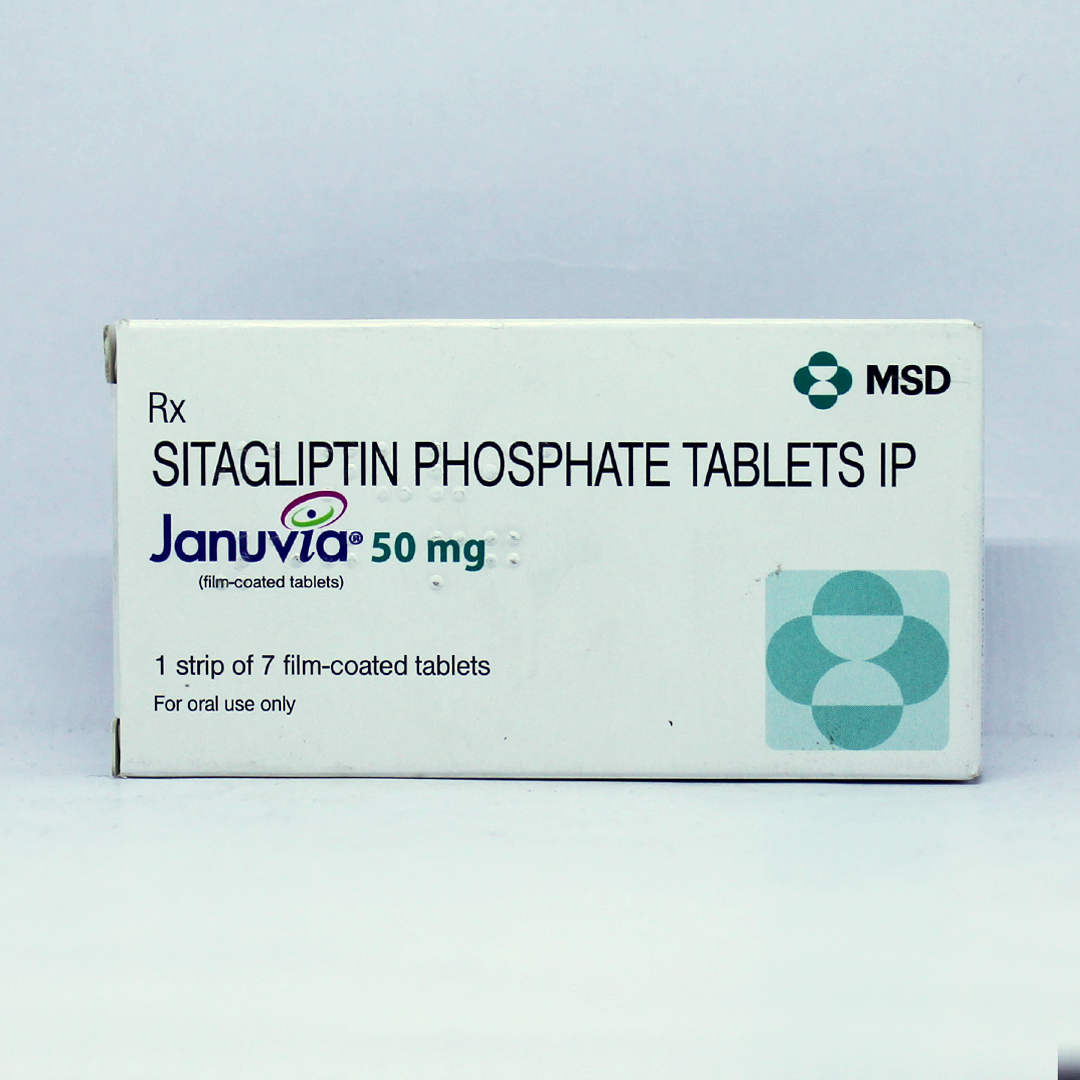

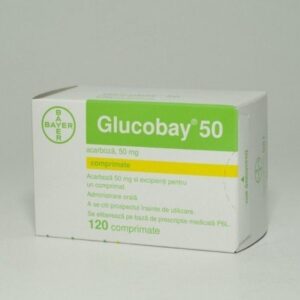

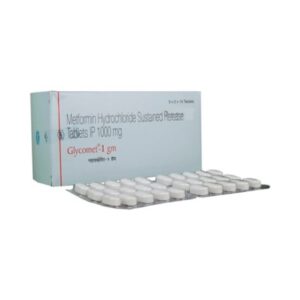
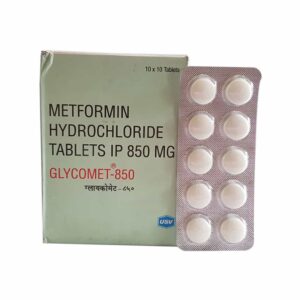
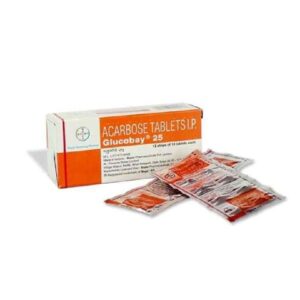
Leave a Reply
You must be logged in to post a comment.